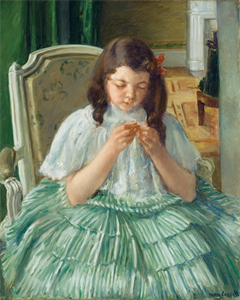Object Results
| Showing 1 of 1 |
|

Attr. Edwin Forbes
American, 1839–1895
"Portrait of a Confederate Artillery Officer" is attributed to Edwin Forbes, who was born in New York City and studied art there immediately prior to the Civil War. In 1861, at age 22, Forbes joined the ranks of Frank Leslie’s Illustrated Newspaper as a reportorial artist—one of the youngest artists on Leslie’s staff and one of few to cover most of the war. Many of his drawings were published as wood engravings in Leslie’s, one of the most popular weekly news magazines during the war. Like Winslow Homer, the best-known Civil War reportorial artist, Forbes later used his wartime drawings to make paintings and prints. In 1876, he issued Life Studies of the Great Army: A Historical Art Work in Copper Plate Etching Containing Forty Plates, which won a gold medal at the Centennial Exposition. The painting is unsigned, but the donor of this work believed ithat Forbes made it after the war. The red collar and cuffs on the soldier’s jacket are those of a Confederate artilleryman. The three gold bars on the collar indicate the rank of captain, the officer commanding a battery. The elaborate gold stitching on the top of the cap, called a kepi, is typical of that issued to Confederate officers, and the kepi’s red top and red band designate it as part of an artilleryman’s uniform. The individual officer has not been identified, but we can still enjoy a handsome portrait of an unknown Confederate captain attributed to Edwin Forbes, one of the best known of Leslie’s reportorial artists of the Civil War.
American, 1839–1895
Portrait of Unidentified Confederate Artillery Officer
about 1875
Object Type:
Painting
Creation Place:
North America, American
Dimensions:
30 in. x 25 in. (76.2 cm x 63.5 cm)
Medium and Support:
Oil on canvas
Accession Number:
1969.0083
Credit Line:
Gift of Hermann Warner Williams, Jr.
"Portrait of a Confederate Artillery Officer" is attributed to Edwin Forbes, who was born in New York City and studied art there immediately prior to the Civil War. In 1861, at age 22, Forbes joined the ranks of Frank Leslie’s Illustrated Newspaper as a reportorial artist—one of the youngest artists on Leslie’s staff and one of few to cover most of the war. Many of his drawings were published as wood engravings in Leslie’s, one of the most popular weekly news magazines during the war. Like Winslow Homer, the best-known Civil War reportorial artist, Forbes later used his wartime drawings to make paintings and prints. In 1876, he issued Life Studies of the Great Army: A Historical Art Work in Copper Plate Etching Containing Forty Plates, which won a gold medal at the Centennial Exposition. The painting is unsigned, but the donor of this work believed ithat Forbes made it after the war. The red collar and cuffs on the soldier’s jacket are those of a Confederate artilleryman. The three gold bars on the collar indicate the rank of captain, the officer commanding a battery. The elaborate gold stitching on the top of the cap, called a kepi, is typical of that issued to Confederate officers, and the kepi’s red top and red band designate it as part of an artilleryman’s uniform. The individual officer has not been identified, but we can still enjoy a handsome portrait of an unknown Confederate captain attributed to Edwin Forbes, one of the best known of Leslie’s reportorial artists of the Civil War.
Keywords
Click a term to view the records with the same keyword
Portfolio List
Click a portfolio name to view all the objects in that portfolio
This object is a member of the following portfolios:
Your current search criteria is: Keyword is "Q" and [Object]Century is "Nineteenth Century" and [Object]Display Artist is "Attr. Edwin Forbes".
